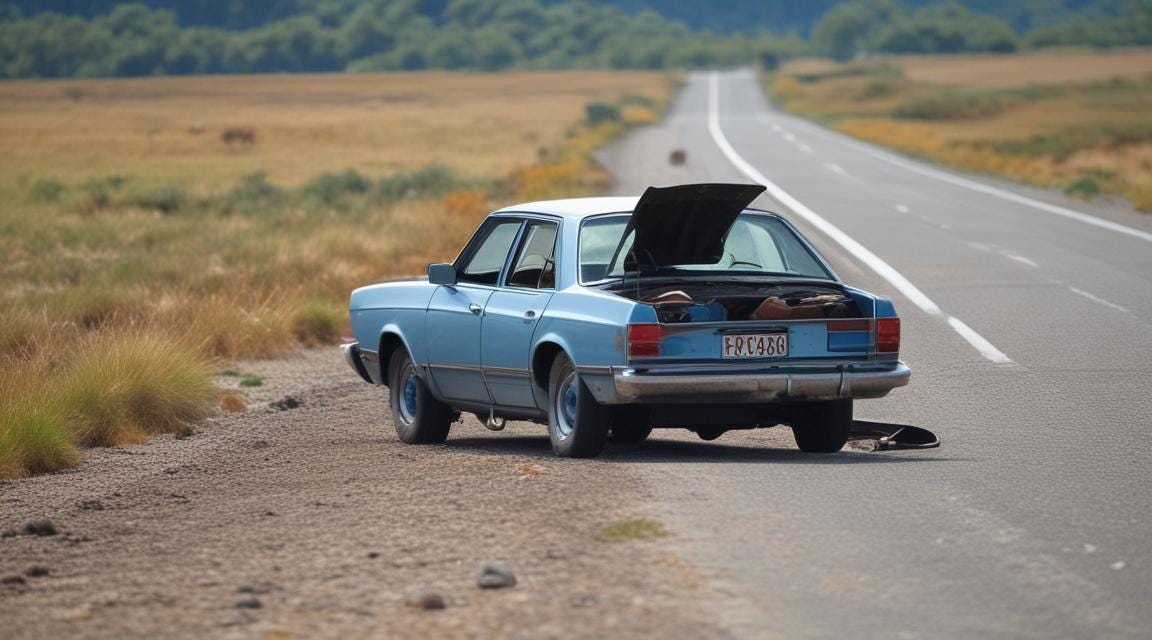What If?
and more catastrophising!
Yesterday, we set off on a short journey. I was driving our Volvo. I pulled out of our lane and as I turned left, the car made a strange scraping noise, as if something was caught underneath it. I pulled over and my husband had a look under the car. There was nothing to see, so I carried on driving. Perhaps half a mile up the road, the noise started again, so I turned onto a private road lined with huge, and in my opinion, rather ugly houses. Once again hubby got out and I turned the car in one of the driveways. There was a deafening, metal on metal screech, as if a whole panel of the car had dropped down and was either scraping along the road or catching against another metal section of the car. It was a horrific noise. Terrifying in fact.
I stopped the vehicle and for the first time since we’ve had it, I rang the ‘On Call’ button in the car. A few seconds later a lady answered and asked me what the problem was. I explained, gave her our numberplate, and then she announced, ‘But your roadside assistance expired just under a year ago. We can’t help you.’ For a moment I was stunned. I was absolutely positive that the roadside assistance had been renewed along with the extended warranty for the car. I tried to explain this to her, but she was having none of it. End of call. I tried ringing the garage, but being a Sunday, there was no answer. I felt a mounting panic. Not for the fact that we might have broken down with no recourse just half a mile from home, but because of the ‘what if’. Two days earlier we had driven nearly one thousand miles across Europe, a journey we’ve done several times during the past year. What if we’d broken down in France with no roadside assistance? The car was fully insured and taxed, but would my insurance have gotten us home? Probably not without roadside assistance. Is it even legal to drive without it?
Very slowly, with the hazard lights on, I drove the car home. In fact, the noise abated when I put my foot on the accelerator and gathered some speed, but I wasn’t taking any risks. The moment we were home, I went into my filing cabinet and found the last service record. And written very clearly, there was a typed sentence that said we had one year’s roadside assistance from the date of the last service. I called the roadside assistance telephone number again.
During this conversation, I was more measured but the lady who answered the phone was also far more helpful. She asked me to hold whilst she spoke to her manager. A couple of minutes later she was back on the line explaining that one of their systems didn’t speak well to the other system and my registration hadn’t been logged on both. We were indeed covered for home and roadside assistance. Relief.
A mere thirty minutes later, an engineer arrived. After performing a few emergency stops, he explained that I’d likely had a tiny stone lodged in the brake pads. He picked up a piece of gravel from the driveway and said that a little stone would create a horrendous noise because the metallic sound is amplified in the wheel arch. There was absolutely nothing wrong with my car. I apologised for calling him out unnecessarily, but he was charming, explaining this happened frequently.
It got me thinking about my writing. How something so seemingly insignificant could have such major consequences. That little stone suggested that something catastrophic had happened with the car. This is an expensive, modern car and nine times out of ten, a hazard light illuminates to notify us of any problems. There hadn’t been any warnings. Yet my past experiences, particularly the death of my best friend in a road traffic accident decades ago, sends my nerves firing off in all directions. I fear the worst. I don’t trust the technology. I let my emotions and fears get the better of me. And my mind unravels with what if, what if, what if. What if we’d broken down in France and I didn’t have the paperwork with me to prove that we had cover? Except we didn’t break down. Our European drive was completely uneventful. The car drove perfectly; the French motorways were a dream. Those what if, negative thoughts are unhelpful to me in my everyday life, except not in my writing. The fact my brain perpetually asks, what if, fires off my imagination and helps me write scene after scene.
I wish there was a middle ground, where I could switch off the what if button in my head. I’ve come to accept that without years of therapy, that’s probably unlikely. So instead I’m embracing it. It helps with my writing. It helps me come up with ideas that start with the tiniest of stones and roll into a huge snowball. And it helps me imagine catastrophic events that are essential for thriller writing.
If you’re stuck in your writing, just ask yourself: what if? But if you find yourself in a real-life difficult situation, I suggest you don’t ask what if. Whatever’s happened has happened, and there’s nothing you can do about it!
Do you agree?



